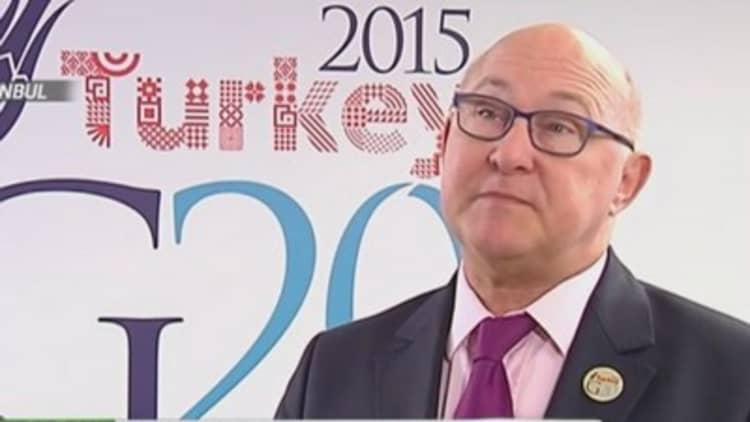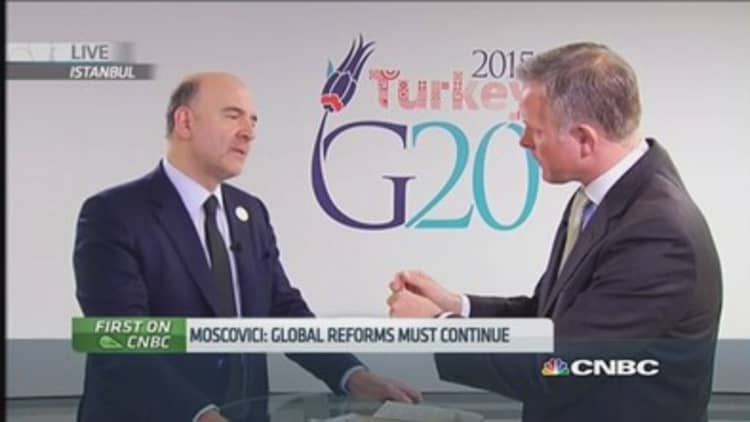



Both sides in the increasingly heated debate over the future of Greece in the euro zone have to respect the each other's views to reach an agreement, French finance minister Michel Sapin has told CNBC.
"There is another way, as long as we respect two principles," he told CNBC Tuesday on the sidelines of the G-20 finance meeting in Istanbul.
"First: we have to respect the Greek vote. A new government was chosen. It is not possible to ask this government to do exactly the same thing we asked from the previous government. Second: Greeks need to know that rules exist in Europe, in the relationship with the IMF, with the ECB, with the European Union. We all have to respect each other and there will be room for an agreement."
Also at the G-20 meeting a senior U.S. Treasury official told CNBC that a mutually agreeable settlement between Greece and the euro zone was the best result and that talk about either side losing out or becoming more unstable as a result of the negotiations was unhelpful.
However, Sapin warned, Greece will have to abide to the conditions of the 240 billion euro ($271 billion) bailout agreement.
"Greeks can't behave as if they arrived in a game where there was no rule. In Europe, there are rules. Greeks have always been part of the IMF; Greeks have been part of the EU almost from the beginning. Greeks say themselves that the ECB is their central bank. So it is in that framework that they have to work."
Read MoreG-20 chiefs plea for'cooler heads' in Greek crisis
Time is rapidly running out for Greece. The "troika" of organizations overseeing the country's loans —the European Central Bank (ECB), International Monetary Fund and European Commission – have said Greece will not receive a final tranche of aid if it does not comply with the conditions of its bailout program, which is due to end at the end of February. In addition, the government has asked the ECB for a bridging loan, which the bank has refused.
As global markets show no signs of calming over the future of the bailout program, all eyes are on the Greek government's "Plan C" to find a compromise with lenders.
On Wednesday, Greek Finance Minister Yanis Varoufakis is expected to meet his euro zone counterparts in Brussels – the eurogroup of finance ministers – to discuss a new set of reform proposals.
Read MoreGreek debt drama is 'theater,' but stakes are high
As well as what has been called "10 surprise reforms" to replace some current austerity measures that the government does not like, Varoufakis is expected to ask for a "bridge program" to cover the government's funding needs while a new debt pact is agreed, Greek newspaper Protothema reported Monday.
Despite repeated insistence from the euro zone that Greece must continue with austerity measures, miniters in the anti-austerity government led by Syriza told CNBC they are confident a solution can be found Wednesday.
"We think we've made a very reasonable set of proposals about what we could take from the old program and what we add to the new program," Euclid Tsakalotos, alternate minister for International Economic Relations for Syriza, told CNBC Monday.
"What we're saying is, yes, there can be a compromise, yes, we have a mandate (to govern) and yes, there are 18 other mandates in the euro zone so we accept that but to listen to our mandate needs time and we think we have been reasonable asking for that time."
'Tamp down the rhetoric'
The latest attempt by the Greek government to strike a chord with its creditors comes after a rollercoaster two weeks in power in which the Greek government has appeared both unrepentant over scrapping austerity measures.
While the new Greek government appeared to try to strike a more conciliatory note with its euro zone neighbors last week, touring European capitals in an effort to drum up support for a new debt deal with lenders. This weekend, however, there seemed to be a change of tack with a return to more bullish, anti-austerity rhetoric.
Prime Minister Alexis Tsipras reiterated that he would not extend the country's current bailout and would not accept more loans while finance minister Varoufakis said the euro zone would collapse "like a house of cards" if Greece left the single currency.
Adding to the pressure, Greece's defense minister said Tuesday that the country could always look elsewhere for financial aid, adding"It could the United States at best, it could be Russia, it could be China or other countries," he said.
Defending the Greek government against accusations that it was trying to "blackmail" Europe into agreeing to its bailout demands, Dimitrios Papadimoulis, Syriza member of the European Parliament (MEP) told CNBC
"We don't want to blackmail anyone, but we don't want to be blackmailed by anyone," he told CNBC Europe's "Squawk Box" Tuesday.
German Chancellor Angela Merkel said on Monday that she would wait for Greece to make a sustainable proposal to repay its debts and other reforms and then discuss what to do next, Reuters reported.
The growing tension has not gone unnoticed elsewhere with equity markets in the U.S. and Asia trading lower on Greek concerns on Monday.
On Sunday, U.S. Treasury Secretary Jack Lew told CNBC that "everybody's got to tamp down the rhetoric a little bit."
"The heat has to come down a little bit in the conversation… the sooner that happens, the better…there needs to be a conversation where Greece and all of the parties that it's engaged with, look for a practical, pragmatic path forward-- which I think is in everybody's best interest," Lew said in an interview broadcast Monday.
The Canadian Finance Minister Joe Oliver also told CNBC Monday that the Greek government "would have to back off a bit from its public rhetoric and they're going to have to make significant, continued sacrifices." He did not believe that debt forgiveness was on the cards.
Sapin, meanwhile, said that the Greeks needed to use more diplomatic language in power.
"Words have a meaning and a strength. And you can't talk the same way when you are finance minister or prime minister than when you were just a candidate."
- By CNBC's Holly Ellyatt, follow her on Twitter @HollyEllyatt. Follow us on Twitter: @CNBCWorld


